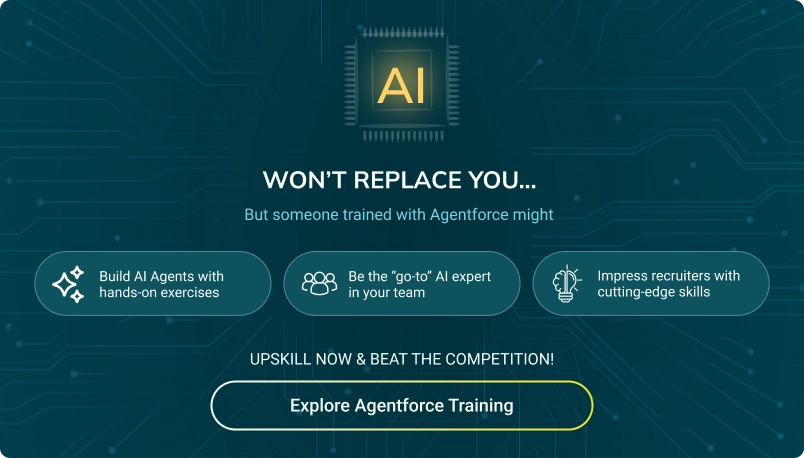Table of Contents
Are you preparing for the Salesforce Apex interview? We’ve got your back! Understanding this powerful programming language can be tedious, but we have provided you with the most popular Apex interview questions and answers.
Remember that the key to success is not simply memorizing answers but also capturing the fundamental concepts and applying them in real-world settings. Keep practicing, being curious, and improving your knowledge to become an expert Salesforce Developer. To feel confident and well-prepared, you should read the entire questions covered in our blog.
Salesforce Apex Interview Questions for Beginners
1. What is Apex?
Apex is an OOP (Object-Oriented Programming Language) that helps developers implement transactional control statements and execute flow in association with calls to the API. It uses syntax that is quite similar to Java syntax, but it works like a database-stored process. Apex enables developers to carry out business logic with the majority of system events, including tab clicks, associated record updates, and Visualforce pages.
2. What is Apex Scheduler?
Apex Scheduler is a useful feature that is used to schedule the logic written in Apex Class which implements a Schedulable interface at specified times.
3. What is an Abstract Class?
An abstract class in object-oriented programming cannot be constructed on its own but is intended to be subclassed. It may include abstract methods without implementation, which derived classes must define.
4. What do you understand about Scheduler Class in Apex?
A Scheduler Class in Salesforce is an Apex class that implements the Schedulable interface, allowing you to schedule Apex code to execute at specific intervals, such as daily or weekly, via the Salesforce user interface or the System.schedule() method.
5. What are Apex Triggers?
Apex Triggers are scripts that run before or after a Salesforce record is created, changed, or deleted. They are used to carry out specialized tasks and automate procedures.

6. What are SOSL and SOQL?
SOSL (Salesforce Object Search Language) and SOQL (Salesforce Object Query Language) are query languages used to search for Salesforce data. SOQL queries a single object, but SOSL queries many objects.
7. What do you mean by test class in Apex?
The test class in Apex is useful for writing unit tests for customized Apex code. It helps ensure that code works expectedly and meets the standard requirement of having at least 75 percentage of code coverage.
8. How do you deal with exceptions in Apex?
There is a unique approach of using try-catch blocks to handle the exceptions in Apex. In this process, developers try a block of code and detect any exceptions that arise. This process allows us to prevent errors gracefully.
9. Differ between before and after trigger.
Before triggers are used to alter or validate record values before saving them to the database, whereas after triggers are used to retrieve system-set record values, such as a record’s ID and perform actions like DML on related record, validation, Sending email, etc.
10. What is an Apex transaction?
An Apex transaction is a collection of actions completed as a single unit. All operations either finish successfully or are rolled back in the event of an error.
Read More:
What is Apex and its Features
Salesforce Apex Interview Questions for Professionals
1. What are the best ways to write maintainable Apex Code?
There are some best practices that include writing usable and modular code, consistent and clear conventions and adhering to coding standards of the Salesforce.
2. How would you use the custom metadata types in the Apex?
Apex uses custom metadata classes to store customizable application data, which can be fetched effectively in code without exceeding SOQL restrictions.
3. What is Apex Context, and what are its types?
Apex content is the execution environment in which Apex code runs, such as batch jobs, web services, and triggers. Every context has its own behavior and governor limits.
4. How to manage transactional control in Apex?
In Apex, transactional control is managed by using the methods of Database class for DML operations that allow granular error control and partial success handling.
5. How do we handle callout limits in Apex?
Callout limits can be controlled by batching callouts when practical, implementing future methods or batch apex for asynchronous calls, and keeping track of callout times and sizes.
6. What strategies can be implemented to manage governor limits in the complex Apex applications?
Should ensure that code is following the best practices like no DML or Query should be used. Also, Whenever any bulk or long-running processes are taking place then needs to use Asynchronous apex. Developers use Salesforce technologies to provide efficient exception handling and monitor system limits.
7. How to ensure code readability and maintainability in large Apex projects?
Optimizing the best coding practices, implementing modular coding patterns, utilizing clear and consistent naming conventions, and using thorough documentation for readability and maintainability.
8. How can the technical debt and feature development be balanced in the Apex?
Balancing means prioritizing feature development based on business requirements while dedicating time to address technical debt through refactoring and optimization.
9. How to ensure security in Apex?
Security is ensured by adhering to Salesforce’s security requirements, utilizing sharing and field-level protection, and frequently examining code for weaknesses.
10. How do we deploy and manage Apex code in multiple environments?
Version control systems, such as Git, use a CI/CD pipeline for automated testing and deployment, ensuring code consistency across multiple environments. sf commands are used within CI/CD for the same.
Asynchronous Interview Questions in Salesforce
1. What is Asynchronous Apex?
Salesforce’s asynchronous Apex helps to conduct processes in the background without stopping the main thread. This is useful for tasks that take a long time to complete, calling external services, analyzing massive data sets, or running batch jobs. Asynchronous Apex methods assist in enhancing the performance and manageability of your Salesforce applications.
While using the Salesforce application, developers store vast amounts of data in the org, which keeps growing annually. If they need to perform a long-running job, synchronous Apex will return the limit error, heap size error, or timeout error. To avoid such problems, they can do long-running or time-consuming processes using Asynchronous Apex, which runs in a separate thread and does not interfere with the main thread. As a result, Asynchronous Apex is utilized to restart the process in a separate thread later.
2. Where can we use the Asynchronous Apex?
Asynchronous Apex can be used in the time-consuming operations like:
- Scheduling the job for a specific time
- Drafting and sending emails to the end-user
- Writing complex reports by using the Apex code
- Sharing recalculation
- Chaining the Apex code, which can use the API call
3. What are the types of Asynchronous Apex?
Salesforce has four types of Asynchronous Apex: future methods, batch Apex, queueable Apex, and scheduled Apex. Each type of Asynchronous Apex enables processes to run in the background, improving performance and efficiency.
4. State the benefits of Asynchronous Apex.
Asynchronous Apex provides various benefits:
- Improved Performance: It helps to improve performance by moving long-running processes to the background, freeing up system resources.
- Prevents Timeouts: Handles time-consuming activities without generating request timeout.
- Efficient Data Processing: Improves the management of significant data volumes and complex operations.
- Scalability: Allows for concurrent processing, which improves program scalability.
- Enhanced User Experience: Maintains responsiveness of the main program, resulting in a smoother user experience.
5. What is the correct approach to using Asynchronous Apex?
Asynchronous Apex is best suited for resource-intensive or time-consuming operations, including data processing, external service calls, and scheduled tasks. It preserves system stability and performance by handling errors correctly and monitoring them.

Final Word
Getting ready for the Salesforce Developer interview can be stressful, but you can confidently answer any question with the correct resources and a solid approach. Understanding the essential concepts of Apex is also helpful in showcasing your knowledge. This compilation of popular Apex interview questions and answers will give you a strong base, ensuring you are prepared to impress your hiring authorities.
Best of luck with the interview preparation, and your journey in the Salesforce ecosystem will be fruitful and successful. Happy coding!
Join our newsletter: Get daily update on Salesforce career insights & news!
Join Now!

















